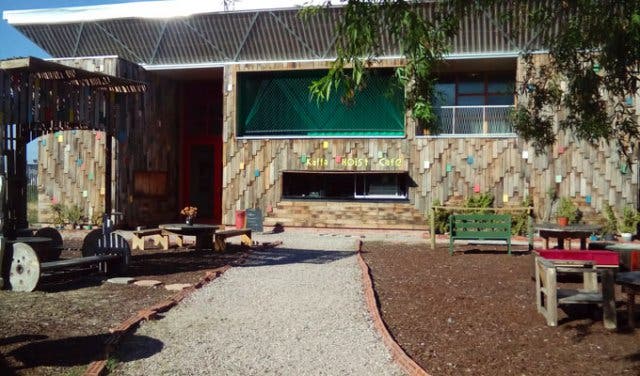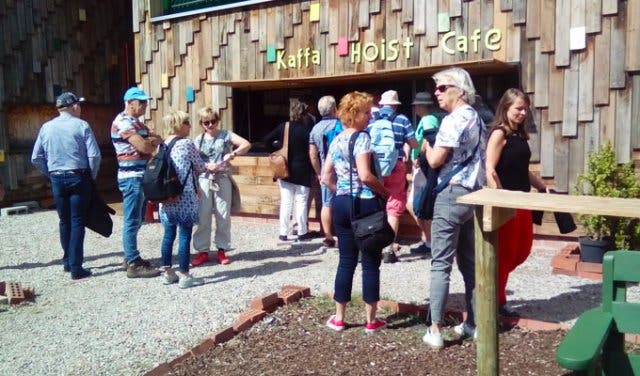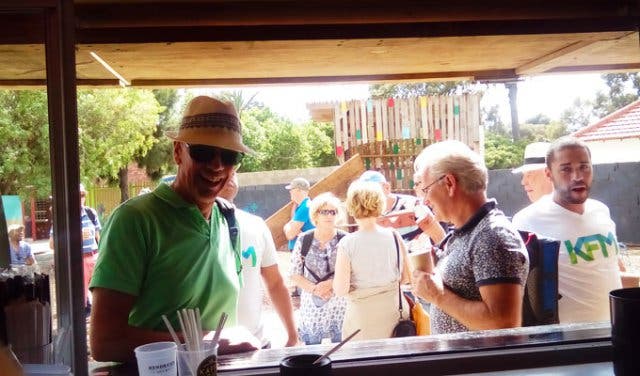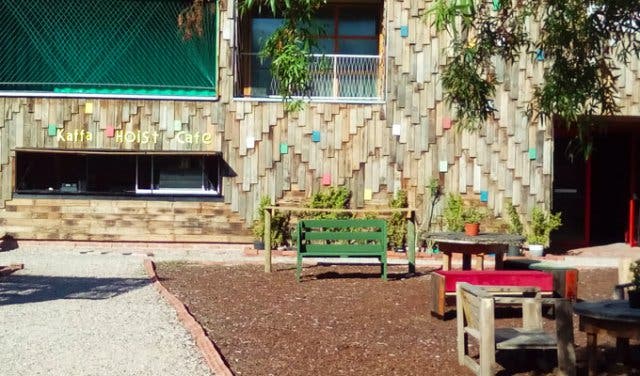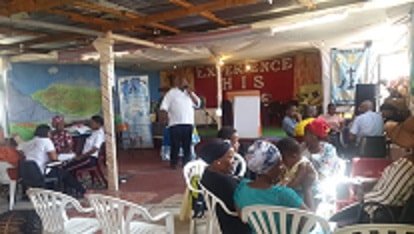“We love you, we love you, you don’t have to love us, we love you…”
drummer Louis Moholo-Moholo enthused during a series of concerts at
Guga S’thebe Arts Centre in Langa (Cape Town) earlier in 2018.
The series, titled SONKE—Uplift the People—came in
three-parts: each an outdoor concert at the Guga S’thebe amphitheater. A
mark of respect for a musician who during his decades overseas helped
first collaboratively establish the Blue Notes as “a school” then become
a pivotal figure in the free jazz movement. SONKE (meaning
together) sought to allow Louis (aka Bra Tebs, or Bra Louis, or Ntate
Louis or Mr Moholo-Moholo depending on your positionality) the room to
shine on his home turf while also allowing Langa locals to hear and
celebrate a home-grown icon in action. Now, more than ten years since he
returned from exile (“It’s a motherfucker,” he memorably said) and
pushing 80 years of age, Bra Louis remains hyper-charged and hungry to
play; that is, when musicians and concert organizers have the stamina to
work with him.
In the last 12 months, including the SONKE shows, Louis has performed half a dozen times at Guga S’thebe. Recently, Moholo-Moholo performed here as part of Sipholeni Sonke,
a concert and film project from students of Cape Peninsula University
of Technology (CPUT). Also featuring students and mentors from the
Winston Mankunku Ngozi Jazz Foundation (based in Gugulethu), Sipholeni Sonke
(we heal/chill together) aims to portray a narrative of the ongoing
cultural work(ers) using music as a uniting force within communities in
Langa and Gugulethu. The student film-makers from CPUT are fundraising for their venture until July 19th.
In early June, Moholo-Moholo was acknowledged in concert and
conversation by The Centre for Humanities Research at the University of
the Western Cape. The focus from UWC picked up and extends an academic
interest tweaked in 2016 by the Louis Moholo-Moholo Legacy Project, an
eclectic program arranged by the Centre for African Studies at
University of Cape Town. For all the merits and importance of these
initiatives, it remains to be seen how the legacies of Louis
Moholo-Moholo and the Blue Notes will enter the curriculum and be taught
or acknowledged on an ongoing basis.
The SONKE concerts were without an institutional agenda.
Running three consecutive weekends through late January into February,
Bra Louis was given space to be celebrated and enjoy himself for more
than just a one-off gig.
“KwaLanga kumnandi…” goes the song. “In Langa it’s nice.” And yes, the lokshin
closest to Cape Town’s leafy (and still mostly white) suburbs and city
center possesses a certain appealing energy. It feels different to
denser, more populated areas of the Cape Flats. It’s a feeling hard to
put into words, or perhaps just into English. And so, as the song goes:
“KwaLanga kumnandi…”
Regarded as the second oldest township countrywide, in Langa the
cultural history runs deep. But what of the study, the books or theses
published on this? Where is this knowledge shared?
With much of Langa’s musical history still unwritten and/or
disseminated into public consciousness, stories mostly remain in
conversation(s) with elders, including Louis, or Mpumi Moholo (his
wife), Pallo Jordan, or other less high-profile age mates. Once such
tale is of Sigcawu Street, where, in the 1950s, so the story goes, in
that street alone there were 80 or more gifted musicians active; Louis
Moholo was one (then drumming with The Chordettes) another was
Christopher “Colombus” Ngcukana (father to Duke, Ezra and Fitzroy).
Perhaps it’s an overly nostalgic view but then, a spirit, the spirit
of togetherness, seemed lit. And now? Where is such spirited
togetherness, the jam sessions, the hub/clubs, where is the jazz in
Langa now?
At the first and third of the SONKE concerts Louis sat with a
small band of musicians chosen from his generation-crossing contact
book. On keys, Mr Mervyn Africa, a comrade from time together in London.
Fellow Langa resident Fancy Galada sang. Bassist Brydon Bolton
continued as one of Louis’ regular Cape Town collaborators. Then for the
frontline, two shows featured saxophonist Abraham Mennen, with
reinforcement coming in the third concert from Langa-born elder Duke
Norman (tenor sax) and trumpeter Mandisi Dyantyis.
Each of those shows offered its own magic and memories. In the first
gig (taking place the week Bra Hugh passed), Fancy Galada pushed her
voice through extended, marauding versions of “Dikeledi,” “The Tag” and
“Yakhal’inkomo.” Blowing adeptly, Abraham Mennon managed to tenderly
express much-loved melodies while also finding room to let loose, at
times removing the mouth piece of his horn to generate all manner of
squeaks and shrieks. And then, in the third concert not only did Mandisi
Dyantyis’ playing bring additional warmth and extra dimension to the
ensemble but Louis’ own understated crooning vocals repeatedly came to
the fore: “Yes baby. No baby. Yes baby!”
The second SONKE concert offered a duet format akin to that
which Louis has explored through the years with Cecil Taylor, Irene
Schweizer, Keith Tippett and scores of piano players. A baby grand piano
was wheeled onto the stage and Hilton Schilder, the chosen pianist,
invited to express himself opposite Louis.
Moving in and out of intense improvised exchanges, glimpses of
recognisable melodies fleetingly revealed themselves (including
Schilder’s composition “Birsigstrasse 90” and John Coltrane’s “Naima”).
Throughout both sets the two colourful artists shone; Hilton in a grey
cape wagging its tail in the gusting wind, Louis working his kit wearing
a signature porkpie hat. Following the interval, looking all the more
epic after sunset, Hilton prepared the piano with the chain worn around
his neck placed under the bonnet. Thereafter (until its removal) notes
rushed in a sharper key, an act of experimentation illustrating the type
of creative thought and bravery Moholo-Moholo still relishes from
musicians he takes the stage with. Tuning into each other, channelling
circles and cycles of sounds, under a starry sky the wind blew and these
two hip kings played.
“Working with Louis Moholo I find I do a lot of things I wouldn’t get into with anybody else.” The pianist Stan Tracey told Melody Maker in 1973. Forty-five years later, in the liner notes for Moholo-Moholo’s latest album release Uplift the People
(Ogun Records, 2018), bandmates Alexander Hawkins, Jason Yarde, John
Edwards and Shabaka Hutchings similarly express their appreciation for
how Bra Louis musically provokes them.
Gigs in London (the Moholo’s home away from home for half a century)
still come Louis’ way. He’s due back there in October for an improv
festival. Up in that metropole, the force Moholo and fellow Blue Notes [study guide here: with Johnny Dyani] brought with them, shaking the scene on their arrival in the mid-1960s continues to affect generations of musicians.
Back in the early 1970s, Louis briefly returned to South Africa, then
under Apartheid’s heavy manners. Moments of his visits to Langa were
documented, in part with an audio recording by Ian Bruce Huntley from Langa Town Hall.
There Moholo played alongside a group of musicians including Winston
Mankunku Ngozi and a young Ezra Ngcukana. Listening back to that
concert, a thunderous Brotherhood of Breath-like storm stacked with a
dozen or so musicians laying down lines and loops of melodies on top of
or within each other’s playing, it makes me wonder if such intensity is
carried by ensembles playing in the Cape, or elsewhere in South Africa
today.
Photos by Basil Breakey also allow us to look at Moholo’s 1972 trip
home. Two shots in particular are striking. In Langa Stadium, Louis
Moholo is at the drums surrounded by a standing crowd, looking on.
Shoulders high, biceps bulging, he wears a waistcoat over a vest adorned
with a star. Mouth open and eyes wide he is staring at whoever the
musicians with him at this moment are. Above all the figures is a clear
sky, grey in one image, white in the other, blown out in Breakey’s
image. Those two photos were partial inspiration for the SONKE concerts.
Visions of the music (back) in Langa. Back outside. In the open air,
where the music, the vibrations may travel up and outwards, in and
across the township. Sounds that cannot be contained. Sounds that are
free. Free(d) jazz.
A few weeks after the SONKE shows, Louis Moholo-Moholo
performed as a headline act at the 2018 Cape Town International Jazz
Festival, a gala the promoters annually subtitle “Africa’s Greatest
Gathering” and colloquially referred to as The Jazz. Year on
year conversations locally bemoan how the festival overemphasizes styles
of music/musicians unrecognizable as being jazz artists, be it jazz as a
history, a mode or method of music making. That history, and
feelings—these ways of playing and performing (on the edge, in the
present)—have been embodied by Moholo-Moholo for almost all his life. To
play under an open sky in his home, Langa, feels right, it felt right.
And as he often says in his still hip way: right on.
But, truth is, to put on shows like SONKE takes a lot. Crews
have to come together and organize such occasions, money is tight,
people are busy, infrastructure seems to be built elsewhere. Without
government support forthcoming it takes individuals, collectives,
friends helping each other to get things happening. So what else to do
but keep on? Do we not owe it to the elders around us? Right on…
When the sun sets, alakutshon’ilanga, will we have listened (and learnt) all that the elders around us had to share? Asimameleni sonke. Let us listen together. Sibeni sonke. Sisonke.


